2022届高三英语二轮复习概要写作(2019年浙江省高考真题)课件(21张ppt)
文档属性
| 名称 | 2022届高三英语二轮复习概要写作(2019年浙江省高考真题)课件(21张ppt) |
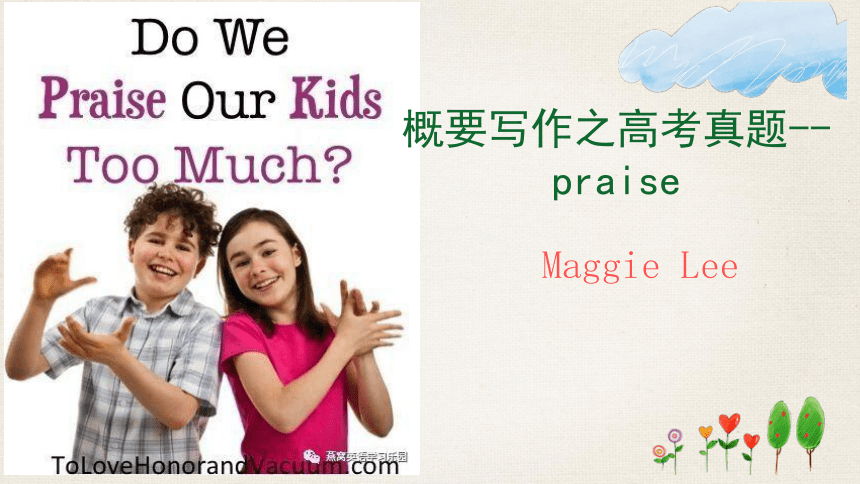
|
|
| 格式 | zip | ||
| 文件大小 | 16.5MB | ||
| 资源类型 | 教案 | ||
| 版本资源 | 通用版 | ||
| 科目 | 英语 | ||
| 更新时间 | 2021-12-02 22:38:24 | ||
图片预览

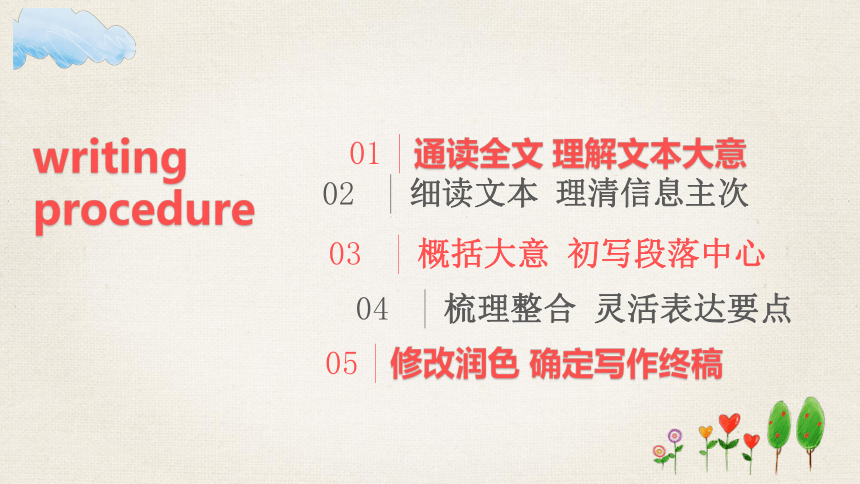
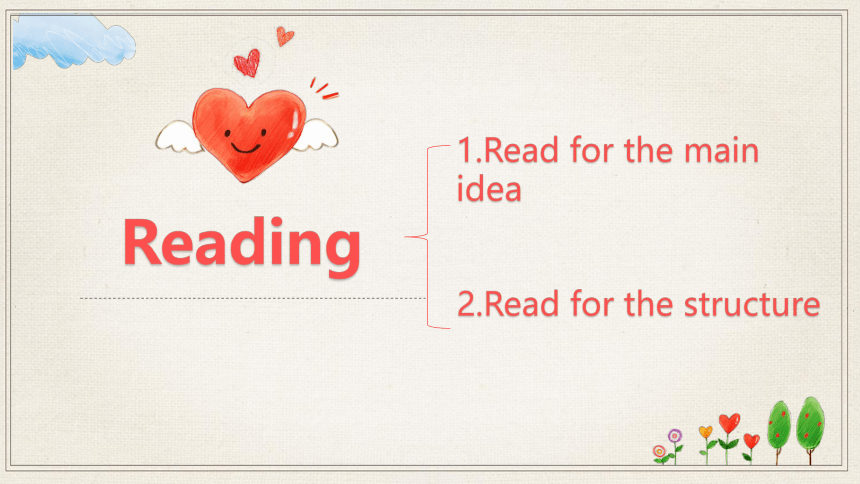
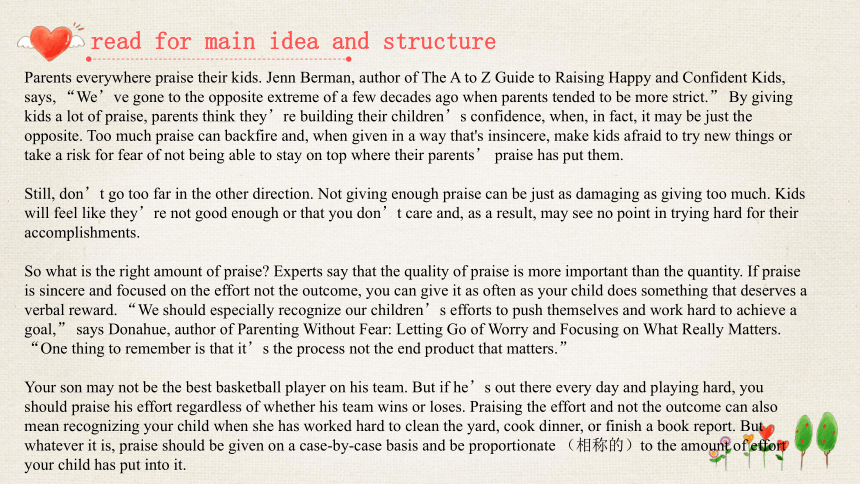
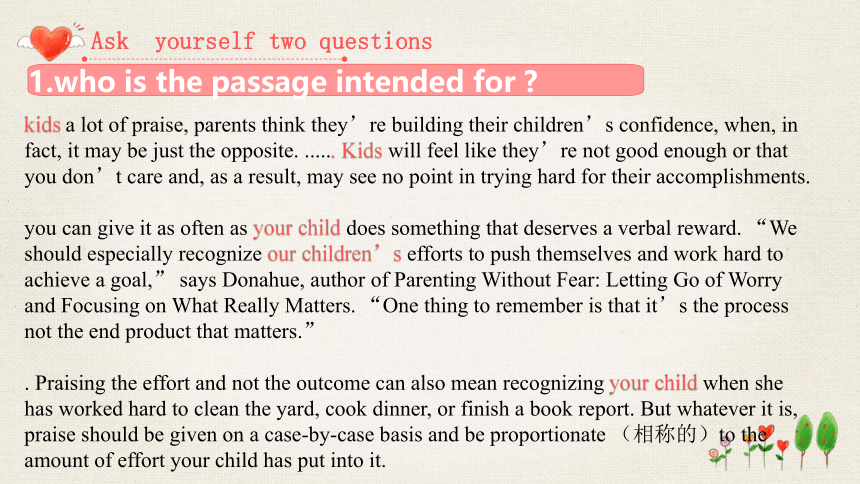
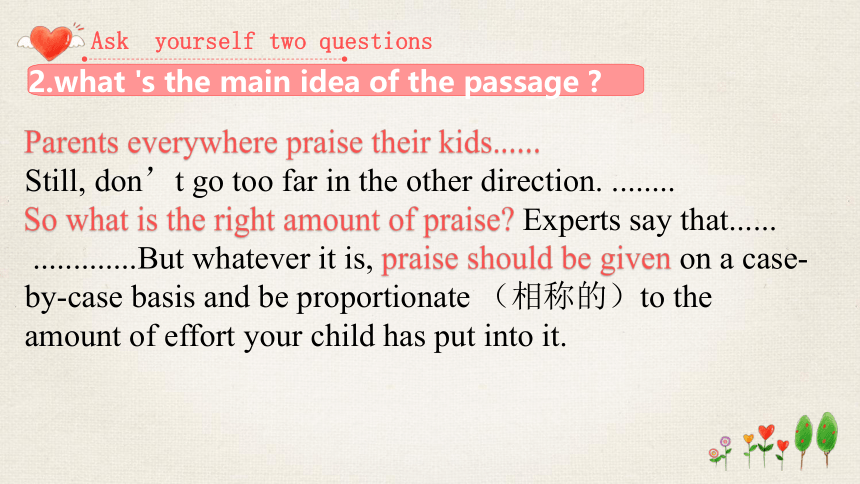
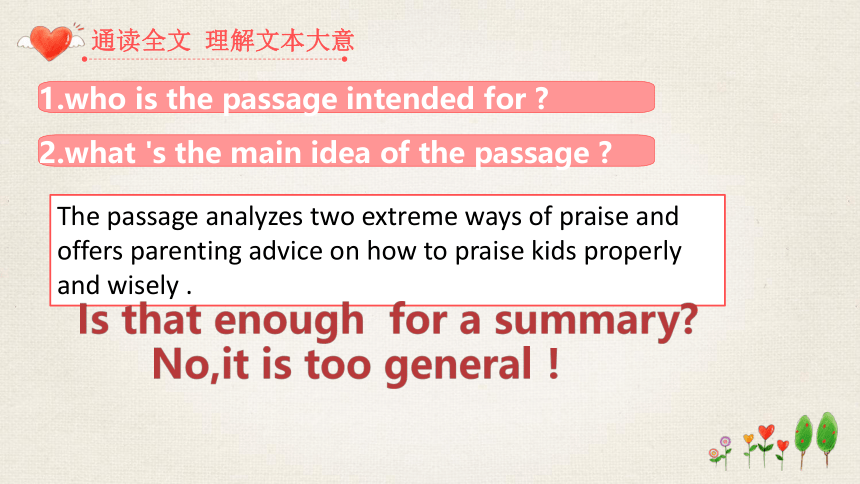
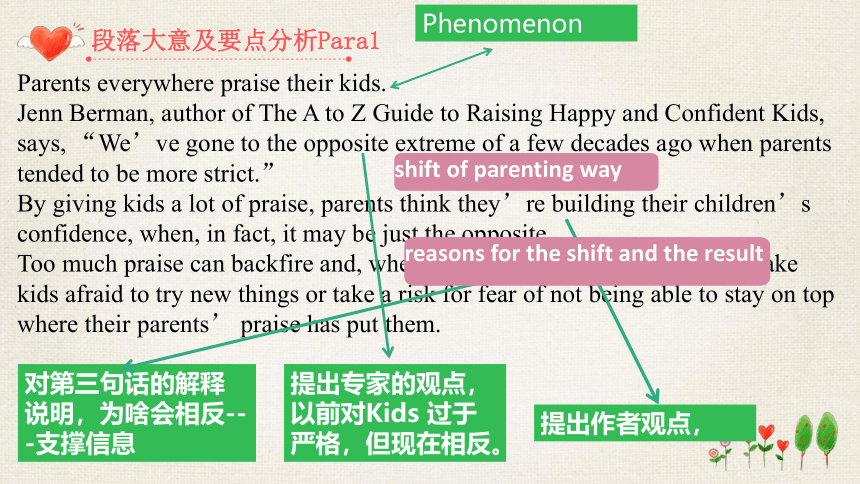
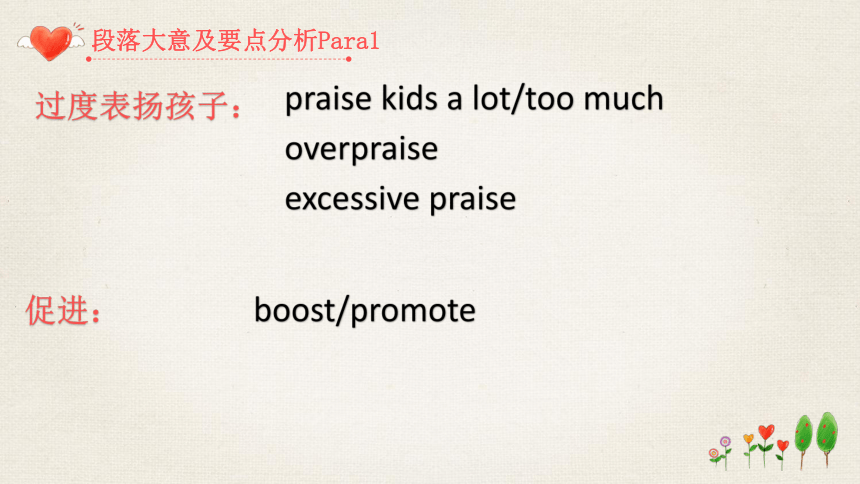
文档简介
(共21张PPT)
概要写作之高考真题--praise
Maggie Lee
05
修改润色 确定写作终稿
02
细读文本 理清信息主次
03
概括大意 初写段落中心
04
梳理整合 灵活表达要点
writing procedure
01
通读全文 理解文本大意
Reading
1.Read for the main idea
2.Read for the structure
read for main idea and structure
Parents everywhere praise their kids. Jenn Berman, author of The A to Z Guide to Raising Happy and Confident Kids, says, “We’ve gone to the opposite extreme of a few decades ago when parents tended to be more strict.” By giving kids a lot of praise, parents think they’re building their children’s confidence, when, in fact, it may be just the opposite. Too much praise can backfire and, when given in a way that's insincere, make kids afraid to try new things or take a risk for fear of not being able to stay on top where their parents’ praise has put them.
Still, don’t go too far in the other direction. Not giving enough praise can be just as damaging as giving too much. Kids will feel like they’re not good enough or that you don’t care and, as a result, may see no point in trying hard for their accomplishments.
So what is the right amount of praise Experts say that the quality of praise is more important than the quantity. If praise is sincere and focused on the effort not the outcome, you can give it as often as your child does something that deserves a verbal reward. “We should especially recognize our children’s efforts to push themselves and work hard to achieve a goal,” says Donahue, author of Parenting Without Fear: Letting Go of Worry and Focusing on What Really Matters. “One thing to remember is that it’s the process not the end product that matters.”
Your son may not be the best basketball player on his team. But if he’s out there every day and playing hard, you should praise his effort regardless of whether his team wins or loses. Praising the effort and not the outcome can also mean recognizing your child when she has worked hard to clean the yard, cook dinner, or finish a book report. But whatever it is, praise should be given on a case-by-case basis and be proportionate (相称的)to the amount of effort your child has put into it.
Ask yourself two questions
1.who is the passage intended for
kids a lot of praise, parents think they’re building their children’s confidence, when, in fact, it may be just the opposite. ...... Kids will feel like they’re not good enough or that you don’t care and, as a result, may see no point in trying hard for their accomplishments.
you can give it as often as your child does something that deserves a verbal reward. “We should especially recognize our children’s efforts to push themselves and work hard to achieve a goal,” says Donahue, author of Parenting Without Fear: Letting Go of Worry and Focusing on What Really Matters. “One thing to remember is that it’s the process not the end product that matters.”
. Praising the effort and not the outcome can also mean recognizing your child when she has worked hard to clean the yard, cook dinner, or finish a book report. But whatever it is, praise should be given on a case-by-case basis and be proportionate (相称的)to the amount of effort your child has put into it.
Ask yourself two questions
2.what 's the main idea of the passage
Parents everywhere praise their kids......
Still, don’t go too far in the other direction. ........
So what is the right amount of praise Experts say that......
.............But whatever it is, praise should be given on a case-by-case basis and be proportionate (相称的)to the amount of effort your child has put into it.
通读全文 理解文本大意
2.what 's the main idea of the passage
1.who is the passage intended for
The passage analyzes two extreme ways of praise and offers parenting advice on how to praise kids properly and wisely .
No,it is too general !
Is that enough for a summary
段落大意及要点分析Para1
Parents everywhere praise their kids.
Jenn Berman, author of The A to Z Guide to Raising Happy and Confident Kids, says, “We’ve gone to the opposite extreme of a few decades ago when parents tended to be more strict.”
By giving kids a lot of praise, parents think they’re building their children’s confidence, when, in fact, it may be just the opposite.
Too much praise can backfire and, when given in a way that's insincere, make kids afraid to try new things or take a risk for fear of not being able to stay on top where their parents’ praise has put them.
Phenomenon
对第三句话的解释说明,为啥会相反---支撑信息
提出专家的观点,以前对Kids 过于严格,但现在相反。
提出作者观点,
shift of parenting way
reasons for the shift and the result
段落大意及要点分析Para1
praise kids a lot/too much
overpraise
excessive praise
过度表扬孩子:
促进:
boost/promote
段落大意及要点分析Para1
取得相反的效果:
achieve the opposite result
the praise doesn't boost kids' confidence as expected.
Kids' confidence is not promoted as desired.
段落大意及要点分析Para1
By giving kids a lot of praise, parents think they’re building their children’s confidence, when, in fact, it may be just the opposite.
Parents believe prasing can help boost children's confidence while too much praise may result in opposite effects.
Nowadays , parents praise children too much , which mayy result in children's lack of confience
段落大意及要点分析Para1
Still, don’t go too far in the other direction.
Not giving enough praise can be just as damaging as giving too much. Kids will feel like they’re not good enough or that you don’t care and, as a result, may see no point in trying hard for their accomplishments.
1.给出一个观点,不要走另一个极端
2.提出作者观点,表扬太少有害
3.对2的解释,说明具体是怎样的害处
Not giving enough praise can be just as damaging as giving too much.
as a result, may see no point in trying hard for their
accomplishments
段落大意及要点分析Para1
表扬不够:
deficient praise
lack of praise
inadequate praise
不愿意努力:
deprive kids of motivation
段落大意及要点分析Para1
trigger:v.引发,激发
Kids feel discouraged when not given enough praise
Not giving enough praise can be just as damaging as giving too much.
negative effect.
discourage使..气馁,使..失去信心
shortage/disadvantage
inadequate不充分的,不足的
The shortage of praising will trigger negative effects.
Inadequate praise is also harmful as it results in children's lack of confidence.
the shortage of praisin will trigger negative effeccts .
Inadequate praise is no less harmful as it may deprive the kids of motivation
段落大意及要点分析Para1
So what is the right amount of praise
Experts say that the quality of praise is more important than the quantity.
If praise is sincere and focused on the effort not the outcome, you can give it as often as your child does something that deserves a verbal reward.
“We should especially recognize our children’s efforts to push themselves and work hard to achieve a goal,” says Donahue, author of Parenting Without Fear: Letting Go of Worry and Focusing on What Really Matters.
“One thing to remember is that it’s the process not the end product that matters.”
too much praise is wrong
not enough praise is wrong
how much is right 承上启下
advice
supportingdetails
用提问的方式引出本段话题,采用了专家们的回答
段落大意及要点分析Para1
focus on the effort not the outcome
the quality of praise is more important than the quantity.
it is the process not the end product that matters
parents should give sincere praise based on kids effort rather
than the result.
proper praise should foucs on efforts involed in the process rather than the result .
段落大意及要点分析Para1
Your son may not be the best basketball player on his team. But if he’s out there every day and playing hard, you should praise his effort regardless of whether his team wins or loses. Praising the effort and not the outcome can also mean recognizing your child when she has worked hard to clean the yard, cook dinner, or finish a book report. But whatever it is, praise should be given on a case-by-case basis and be proportionate (相称的)to the amount of effort your child has put into it.
Your son may not be the best basketball player on his team. But if he’s
out there every day and playing hard, you should praise his effort
regardless of whether his team wins or loses. Praising the effort and not
he outcome can also mean recognizing your child when she has worked
hard to clean the yard, cook dinner, or finish a book report.
1,2,3句的举例都为了表达我们要表扬孩子的努力的过程而不是结果。
再次提出建议父母要怎样的合适的表扬。
段落大意及要点分析Para1
parents tend to go to extremes when it comes to praising their kids. however, both too much or too little praise can be damaging . When giving praise , parents should be sincere and focus on the process rather than the result . They are supposed to give praise according to how much effort their kids have put into the work they chose to do.
段落大意及要点分析Para1
Parents believe praising can help boost children's confidence while too much praise may result in opposite effects . However , kids may feel discouraged when not given enough praise . According to experts, it is the quality of praise rather than quantity that matters ,whihc shows parents' sincerity and concentration on process instead of foucing on the outcome . In fact, the praise you have depends on how hard you work.
段落大意及要点分析Para1
The passage analyzes two extreme concering praise and advises paents to praise kids properly . Surprisingly, overprise turns out to be harmful for kids' confidence buiilding while inadequate praise is no better as it may deprive kids of motivation . Quality praise should not stress the result but efforts involved in the process so that kids will keep trying for parents' recognition. In oder to offer sincere and down-to-earth praise , take the real situation and level of effort into account.
概要写作之高考真题--praise
Maggie Lee
05
修改润色 确定写作终稿
02
细读文本 理清信息主次
03
概括大意 初写段落中心
04
梳理整合 灵活表达要点
writing procedure
01
通读全文 理解文本大意
Reading
1.Read for the main idea
2.Read for the structure
read for main idea and structure
Parents everywhere praise their kids. Jenn Berman, author of The A to Z Guide to Raising Happy and Confident Kids, says, “We’ve gone to the opposite extreme of a few decades ago when parents tended to be more strict.” By giving kids a lot of praise, parents think they’re building their children’s confidence, when, in fact, it may be just the opposite. Too much praise can backfire and, when given in a way that's insincere, make kids afraid to try new things or take a risk for fear of not being able to stay on top where their parents’ praise has put them.
Still, don’t go too far in the other direction. Not giving enough praise can be just as damaging as giving too much. Kids will feel like they’re not good enough or that you don’t care and, as a result, may see no point in trying hard for their accomplishments.
So what is the right amount of praise Experts say that the quality of praise is more important than the quantity. If praise is sincere and focused on the effort not the outcome, you can give it as often as your child does something that deserves a verbal reward. “We should especially recognize our children’s efforts to push themselves and work hard to achieve a goal,” says Donahue, author of Parenting Without Fear: Letting Go of Worry and Focusing on What Really Matters. “One thing to remember is that it’s the process not the end product that matters.”
Your son may not be the best basketball player on his team. But if he’s out there every day and playing hard, you should praise his effort regardless of whether his team wins or loses. Praising the effort and not the outcome can also mean recognizing your child when she has worked hard to clean the yard, cook dinner, or finish a book report. But whatever it is, praise should be given on a case-by-case basis and be proportionate (相称的)to the amount of effort your child has put into it.
Ask yourself two questions
1.who is the passage intended for
kids a lot of praise, parents think they’re building their children’s confidence, when, in fact, it may be just the opposite. ...... Kids will feel like they’re not good enough or that you don’t care and, as a result, may see no point in trying hard for their accomplishments.
you can give it as often as your child does something that deserves a verbal reward. “We should especially recognize our children’s efforts to push themselves and work hard to achieve a goal,” says Donahue, author of Parenting Without Fear: Letting Go of Worry and Focusing on What Really Matters. “One thing to remember is that it’s the process not the end product that matters.”
. Praising the effort and not the outcome can also mean recognizing your child when she has worked hard to clean the yard, cook dinner, or finish a book report. But whatever it is, praise should be given on a case-by-case basis and be proportionate (相称的)to the amount of effort your child has put into it.
Ask yourself two questions
2.what 's the main idea of the passage
Parents everywhere praise their kids......
Still, don’t go too far in the other direction. ........
So what is the right amount of praise Experts say that......
.............But whatever it is, praise should be given on a case-by-case basis and be proportionate (相称的)to the amount of effort your child has put into it.
通读全文 理解文本大意
2.what 's the main idea of the passage
1.who is the passage intended for
The passage analyzes two extreme ways of praise and offers parenting advice on how to praise kids properly and wisely .
No,it is too general !
Is that enough for a summary
段落大意及要点分析Para1
Parents everywhere praise their kids.
Jenn Berman, author of The A to Z Guide to Raising Happy and Confident Kids, says, “We’ve gone to the opposite extreme of a few decades ago when parents tended to be more strict.”
By giving kids a lot of praise, parents think they’re building their children’s confidence, when, in fact, it may be just the opposite.
Too much praise can backfire and, when given in a way that's insincere, make kids afraid to try new things or take a risk for fear of not being able to stay on top where their parents’ praise has put them.
Phenomenon
对第三句话的解释说明,为啥会相反---支撑信息
提出专家的观点,以前对Kids 过于严格,但现在相反。
提出作者观点,
shift of parenting way
reasons for the shift and the result
段落大意及要点分析Para1
praise kids a lot/too much
overpraise
excessive praise
过度表扬孩子:
促进:
boost/promote
段落大意及要点分析Para1
取得相反的效果:
achieve the opposite result
the praise doesn't boost kids' confidence as expected.
Kids' confidence is not promoted as desired.
段落大意及要点分析Para1
By giving kids a lot of praise, parents think they’re building their children’s confidence, when, in fact, it may be just the opposite.
Parents believe prasing can help boost children's confidence while too much praise may result in opposite effects.
Nowadays , parents praise children too much , which mayy result in children's lack of confience
段落大意及要点分析Para1
Still, don’t go too far in the other direction.
Not giving enough praise can be just as damaging as giving too much. Kids will feel like they’re not good enough or that you don’t care and, as a result, may see no point in trying hard for their accomplishments.
1.给出一个观点,不要走另一个极端
2.提出作者观点,表扬太少有害
3.对2的解释,说明具体是怎样的害处
Not giving enough praise can be just as damaging as giving too much.
as a result, may see no point in trying hard for their
accomplishments
段落大意及要点分析Para1
表扬不够:
deficient praise
lack of praise
inadequate praise
不愿意努力:
deprive kids of motivation
段落大意及要点分析Para1
trigger:v.引发,激发
Kids feel discouraged when not given enough praise
Not giving enough praise can be just as damaging as giving too much.
negative effect.
discourage使..气馁,使..失去信心
shortage/disadvantage
inadequate不充分的,不足的
The shortage of praising will trigger negative effects.
Inadequate praise is also harmful as it results in children's lack of confidence.
the shortage of praisin will trigger negative effeccts .
Inadequate praise is no less harmful as it may deprive the kids of motivation
段落大意及要点分析Para1
So what is the right amount of praise
Experts say that the quality of praise is more important than the quantity.
If praise is sincere and focused on the effort not the outcome, you can give it as often as your child does something that deserves a verbal reward.
“We should especially recognize our children’s efforts to push themselves and work hard to achieve a goal,” says Donahue, author of Parenting Without Fear: Letting Go of Worry and Focusing on What Really Matters.
“One thing to remember is that it’s the process not the end product that matters.”
too much praise is wrong
not enough praise is wrong
how much is right 承上启下
advice
supportingdetails
用提问的方式引出本段话题,采用了专家们的回答
段落大意及要点分析Para1
focus on the effort not the outcome
the quality of praise is more important than the quantity.
it is the process not the end product that matters
parents should give sincere praise based on kids effort rather
than the result.
proper praise should foucs on efforts involed in the process rather than the result .
段落大意及要点分析Para1
Your son may not be the best basketball player on his team. But if he’s out there every day and playing hard, you should praise his effort regardless of whether his team wins or loses. Praising the effort and not the outcome can also mean recognizing your child when she has worked hard to clean the yard, cook dinner, or finish a book report. But whatever it is, praise should be given on a case-by-case basis and be proportionate (相称的)to the amount of effort your child has put into it.
Your son may not be the best basketball player on his team. But if he’s
out there every day and playing hard, you should praise his effort
regardless of whether his team wins or loses. Praising the effort and not
he outcome can also mean recognizing your child when she has worked
hard to clean the yard, cook dinner, or finish a book report.
1,2,3句的举例都为了表达我们要表扬孩子的努力的过程而不是结果。
再次提出建议父母要怎样的合适的表扬。
段落大意及要点分析Para1
parents tend to go to extremes when it comes to praising their kids. however, both too much or too little praise can be damaging . When giving praise , parents should be sincere and focus on the process rather than the result . They are supposed to give praise according to how much effort their kids have put into the work they chose to do.
段落大意及要点分析Para1
Parents believe praising can help boost children's confidence while too much praise may result in opposite effects . However , kids may feel discouraged when not given enough praise . According to experts, it is the quality of praise rather than quantity that matters ,whihc shows parents' sincerity and concentration on process instead of foucing on the outcome . In fact, the praise you have depends on how hard you work.
段落大意及要点分析Para1
The passage analyzes two extreme concering praise and advises paents to praise kids properly . Surprisingly, overprise turns out to be harmful for kids' confidence buiilding while inadequate praise is no better as it may deprive kids of motivation . Quality praise should not stress the result but efforts involved in the process so that kids will keep trying for parents' recognition. In oder to offer sincere and down-to-earth praise , take the real situation and level of effort into account.
